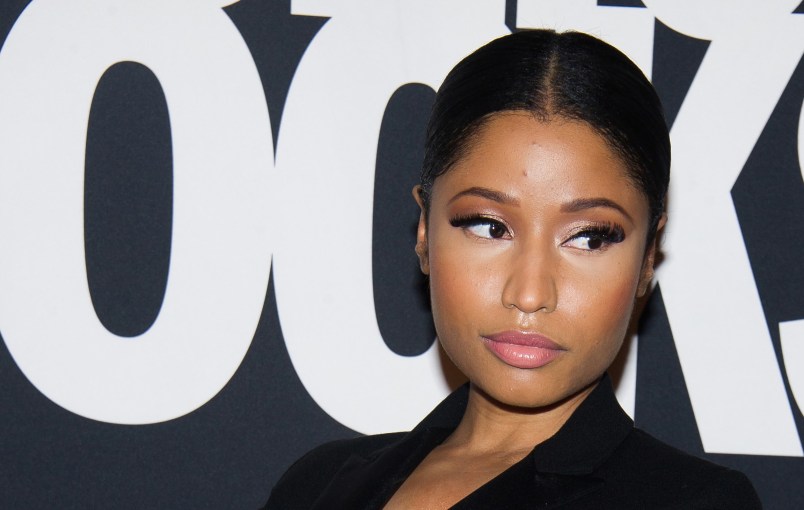A teenager becomes pregnant and isn’t sure what to do. After considering her options, she decides to have an abortion. “I wasn’t ready. I didn’t have anything to offer a child,” she says some years later.
This isn’t an unusual story, except for where it was told—and who told it. In the January 15 issue of Rolling Stone, hip-hop star Nicki Minaj discussed her decision to have an abortion when she got pregnant in high school. Minaj says that the decision has “haunted” her, but continues:
It’d be contradictory if I said I wasn’t pro-choice … I understand people who feel very strongly against it—even women who have gone through it, it’s not something you’re proud of, so it’s hard to speak on it like you only have one way of looking at it. But at the same time, if you’re not ready, you’re not ready.
Minaj’s words get to the heart of something that neither the pro- nor the anti-choice movements are often comfortable discussing: that women can have mixed feelings about choosing abortion but still be pro-choice. They can regret the circumstances that led to having an abortion, but not the abortion itself. They can remember the abortion forever, but still know that it was right for them at that time.
Of course, acknowledging that such emotions can exist within the same woman isn’t in the best interest of the anti-choice movement, which has staked a great deal of its identity on the idea that abortion is bad for all women, full stop. This movement has been savvy about using sound bites and slogans promoting the idea that “abortion hurts women.” While these mantras demonstrate a stunning lack of accuracy, nuance and respect for individual experience, they also pack an emotional punch and are pithy and memorable. So it’s hardly a surprise that the pro-choice movement has felt the need to respond with sound bites and rhetoric of their own. While these are generally more inclusive and accurate (“trust women”), mainstream pro-choice organizations in particular have often shown reluctance to explicitly discuss the more complicated emotions that women can experience around abortion. (And motherhood in general, as Ester Bloom recently explored on this site.)
Minaj has also addressed her abortion in her song “Autobiography,” and she’s just one of a number of musicians who have discussed the subject in their work. From “Brick” by Ben Folds Five to “Bodies” by the Sex Pistols, “Hello Birmingham” and “Lost Woman Song” by Ani DiFranco, Neil Young’s “Song X,” Hole’s “Mrs. Jones,” and “Lime Tree” by Bright Eyes, songs like these present a range of viewpoints on the subject. Musicians have also lent their support to the pro-choice movement, most memorably through the Rock for Choice concert series, which raised awareness not just about abortion but a whole range of social justice issues, including voting registration, that are still incredibly relevant today.
But nothing in art quite matches the stark truth of women that have had abortions talking directly about their experiences. So it is unfortunate how relatively rare it has become for high-profile women to do just that. Not that it never happens, as this list of sixteen celebrities that have talked publicly about their abortions shows. Many of these women, like women everywhere, feel no conflict about their abortions; but others do, from reasons that range from religion to family influence to the circumstances in which they had them. Their stories also offer ample evidence that, while no one should ever feel compelled to talk publicly about a personal choice, doing so can be incredibly powerful. Or, as Margaret Cho says, “I talk a lot about abortion and people get really freaked out. I’m not even making a political statement. I’m just talking about what happened! I have had them and I want to talk about them. I don’t care what your views are toward abortion, I just think women should be talking about it.”
Neither Cho nor Minaj offer easy slogans or rhetoric. Instead, they get at something more important: going beyond the political into the personal, where so much of the abortion experience resides. And as their interviews and the stories featured on websites like the 1 in 3 Campaign and I’m Not Sorry show, these are powerful voices, both anonymous and famous, that people on both sides of the debate would do well to listen to more.
Sarah Erdreich is the author of Generation Roe: Inside the Future of the Pro-Choice Movement. She lives in Washington, D.C. with her family.







A great example is found in a surprising place – Julia Sweeney wrote a mostly amusing book on motherhood (she adopted) & in passing notes her own abortion. First, however, she provides her mother-in-law a chance to provide an extended account of her own abortion in the days when it was illegal.